-
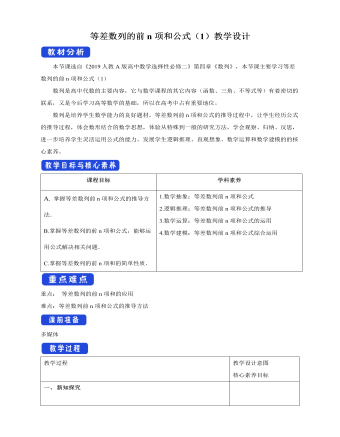
人教版高中数学选择性必修二等差数列的前n项和公式(1)教学设计
高斯(Gauss,1777-1855),德国数学家,近代数学的奠基者之一. 他在天文学、大地测量学、磁学、光学等领域都做出过杰出贡献. 问题1:为什么1+100=2+99=…=50+51呢?这是巧合吗?试从数列角度给出解释.高斯的算法:(1+100)+(2+99)+…+(50+51)= 101×50=5050高斯的算法实际上解决了求等差数列:1,2,3,…,n,"… " 前100项的和问题.等差数列中,下标和相等的两项和相等.设 an=n,则 a1=1,a2=2,a3=3,…如果数列{an} 是等差数列,p,q,s,t∈N*,且 p+q=s+t,则 ap+aq=as+at 可得:a_1+a_100=a_2+a_99=?=a_50+a_51问题2: 你能用上述方法计算1+2+3+… +101吗?问题3: 你能计算1+2+3+… +n吗?需要对项数的奇偶进行分类讨论.当n为偶数时, S_n=(1+n)+[(2+(n-1)]+?+[(n/2+(n/2-1)]=(1+n)+(1+n)…+(1+n)=n/2 (1+n) =(n(1+n))/2当n为奇数数时, n-1为偶数
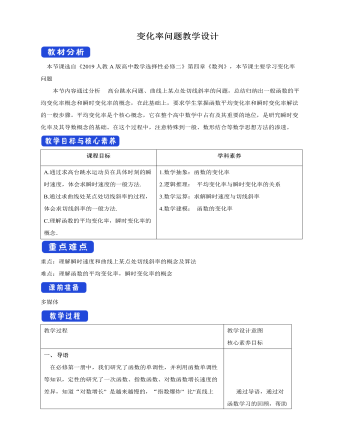
人教版高中数学选择性必修二变化率问题教学设计
导语在必修第一册中,我们研究了函数的单调性,并利用函数单调性等知识,定性的研究了一次函数、指数函数、对数函数增长速度的差异,知道“对数增长” 是越来越慢的,“指数爆炸” 比“直线上升” 快得多,进一步的能否精确定量的刻画变化速度的快慢呢,下面我们就来研究这个问题。新知探究问题1 高台跳水运动员的速度高台跳水运动中,运动员在运动过程中的重心相对于水面的高度h(单位:m)与起跳后的时间t(单位:s)存在函数关系h(t)=-4.9t2+4.8t+11.如何描述用运动员从起跳到入水的过程中运动的快慢程度呢?直觉告诉我们,运动员从起跳到入水的过程中,在上升阶段运动的越来越慢,在下降阶段运动的越来越快,我们可以把整个运动时间段分成许多小段,用运动员在每段时间内的平均速度v ?近似的描述它的运动状态。
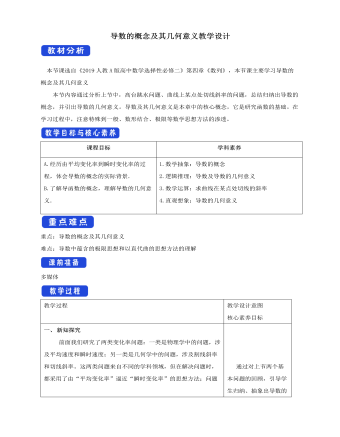
人教版高中数学选择性必修二导数的概念及其几何意义教学设计
新知探究前面我们研究了两类变化率问题:一类是物理学中的问题,涉及平均速度和瞬时速度;另一类是几何学中的问题,涉及割线斜率和切线斜率。这两类问题来自不同的学科领域,但在解决问题时,都采用了由“平均变化率”逼近“瞬时变化率”的思想方法;问题的答案也是一样的表示形式。下面我们用上述思想方法研究更一般的问题。探究1: 对于函数y=f(x) ,设自变量x从x_0变化到x_0+ ?x ,相应地,函数值y就从f(x_0)变化到f(〖x+x〗_0) 。这时, x的变化量为?x,y的变化量为?y=f(x_0+?x)-f(x_0)我们把比值?y/?x,即?y/?x=(f(x_0+?x)-f(x_0)" " )/?x叫做函数从x_0到x_0+?x的平均变化率。1.导数的概念如果当Δx→0时,平均变化率ΔyΔx无限趋近于一个确定的值,即ΔyΔx有极限,则称y=f (x)在x=x0处____,并把这个________叫做y=f (x)在x=x0处的导数(也称为__________),记作f ′(x0)或________,即
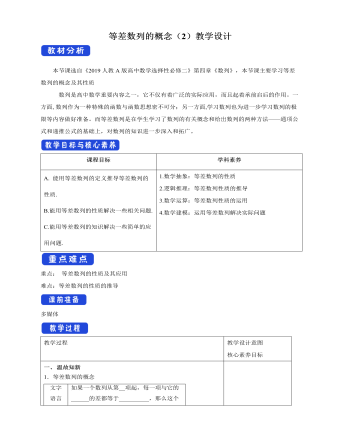
人教版高中数学选择性必修二等差数列的概念(2)教学设计
二、典例解析例3.某公司购置了一台价值为220万元的设备,随着设备在使用过程中老化,其价值会逐年减少.经验表明,每经过一年其价值会减少d(d为正常数)万元.已知这台设备的使用年限为10年,超过10年 ,它的价值将低于购进价值的5%,设备将报废.请确定d的范围.分析:该设备使用n年后的价值构成数列{an},由题意可知,an=an-1-d (n≥2). 即:an-an-1=-d.所以{an}为公差为-d的等差数列.10年之内(含10年),该设备的价值不小于(220×5%=)11万元;10年后,该设备的价值需小于11万元.利用{an}的通项公式列不等式求解.解:设使用n年后,这台设备的价值为an万元,则可得数列{an}.由已知条件,得an=an-1-d(n≥2).所以数列{an}是一个公差为-d的等差数列.因为a1=220-d,所以an=220-d+(n-1)(-d)=220-nd. 由题意,得a10≥11,a11<11. 即:{█("220-10d≥11" @"220-11d<11" )┤解得19<d≤20.9所以,d的求值范围为19<d≤20.9
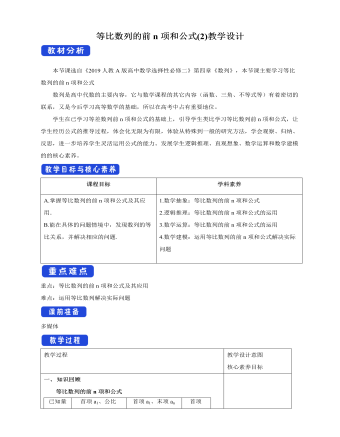
人教版高中数学选择性必修二等比数列的前n项和公式 (2) 教学设计
二、典例解析例10. 如图,正方形ABCD 的边长为5cm ,取正方形ABCD 各边的中点E,F,G,H, 作第2个正方形 EFGH,然后再取正方形EFGH各边的中点I,J,K,L,作第3个正方形IJKL ,依此方法一直继续下去. (1) 求从正方形ABCD 开始,连续10个正方形的面积之和;(2) 如果这个作图过程可以一直继续下去,那么所有这些正方形的面积之和将趋近于多少?分析:可以利用数列表示各正方形的面积,根据条件可知,这是一个等比数列。解:设正方形的面积为a_1,后续各正方形的面积依次为a_2, a_(3, ) 〖…,a〗_n,…,则a_1=25,由于第k+1个正方形的顶点分别是第k个正方形各边的中点,所以a_(k+1)=〖1/2 a〗_k,因此{a_n},是以25为首项,1/2为公比的等比数列.设{a_n}的前项和为S_n(1)S_10=(25×[1-(1/2)^10 ] )/("1 " -1/2)=50×[1-(1/2)^10 ]=25575/512所以,前10个正方形的面积之和为25575/512cm^2.(2)当无限增大时,无限趋近于所有正方形的面积和
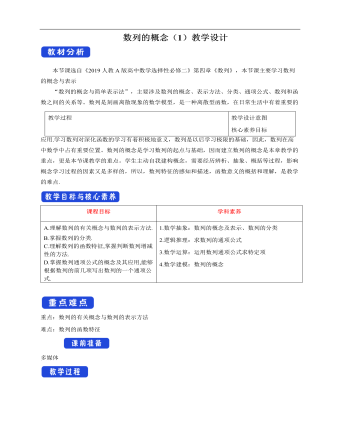
人教版高中数学选择性必修二数列的概念(1)教学设计
情景导学古语云:“勤学如春起之苗,不见其增,日有所长”如果对“春起之苗”每日用精密仪器度量,则每日的高度值按日期排在一起,可组成一个数列. 那么什么叫数列呢?二、问题探究1. 王芳从一岁到17岁,每年生日那天测量身高,将这些身高数据(单位:厘米)依次排成一列数:75,87,96,103,110,116,120,128,138,145,153,158,160,162,163,165,168 ①记王芳第i岁的身高为 h_i ,那么h_1=75 , h_2=87, 〖"…" ,h〗_17=168.我们发现h_i中的i反映了身高按岁数从1到17的顺序排列时的确定位置,即h_1=75 是排在第1位的数,h_2=87是排在第2位的数〖"…" ,h〗_17 =168是排在第17位的数,它们之间不能交换位置,所以①具有确定顺序的一列数。2. 在两河流域发掘的一块泥板(编号K90,约生产于公元前7世纪)上,有一列依次表示一个月中从第1天到第15天,每天月亮可见部分的数:5,10,20,40,80,96,112,128,144,160,176,192,208,224,240. ②
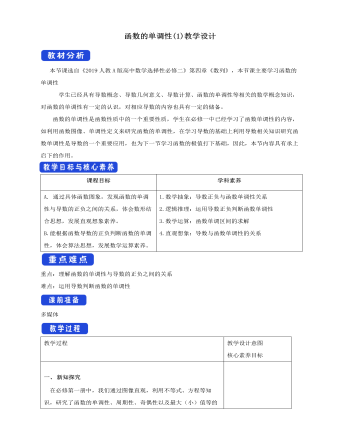
人教版高中数学选择性必修二函数的单调性(1) 教学设计
1.判断正误(正确的打“√”,错误的打“×”)(1)函数f (x)在区间(a,b)上都有f ′(x)<0,则函数f (x)在这个区间上单调递减. ( )(2)函数在某一点的导数越大,函数在该点处的切线越“陡峭”. ( )(3)函数在某个区间上变化越快,函数在这个区间上导数的绝对值越大.( )(4)判断函数单调性时,在区间内的个别点f ′(x)=0,不影响函数在此区间的单调性.( )[解析] (1)√ 函数f (x)在区间(a,b)上都有f ′(x)<0,所以函数f (x)在这个区间上单调递减,故正确.(2)× 切线的“陡峭”程度与|f ′(x)|的大小有关,故错误.(3)√ 函数在某个区间上变化的快慢,和函数导数的绝对值大小一致.(4)√ 若f ′(x)≥0(≤0),则函数f (x)在区间内单调递增(减),故f ′(x)=0不影响函数单调性.[答案] (1)√ (2)× (3)√ (4)√例1. 利用导数判断下列函数的单调性:(1)f(x)=x^3+3x; (2) f(x)=sinx-x,x∈(0,π); (3)f(x)=(x-1)/x解: (1) 因为f(x)=x^3+3x, 所以f^' (x)=〖3x〗^2+3=3(x^2+1)>0所以f(x)=x^3+3x ,函数在R上单调递增,如图(1)所示
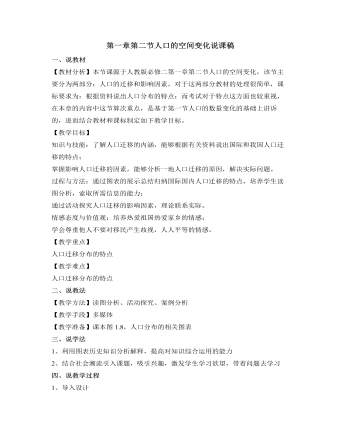
人教版高中地理必修2第一章第二节人口的空间变化说课稿
一、说教材【教材分析】本节课源于人教版必修二第一章第二节人口的空间变化,该节主要分为两部分:人口的迁移和影响因素,对于这两部分教材的处理很简单,课标要求为:根据资料说出人口分布的特点;而考试对于特点这方面也较重视,在本章的内容中这节算次重点,是基于第一节人口的数量变化的基础上讲诉的,进而结合教材和课标制定如下教学目标。【教学目标】知识与技能:了解人口迁移的内涵,能够根据有关资料说出国际和我国人口迁移的特点;掌握影响人口迁移的因素,能够分析一地人口迁移的原因,解决实际问题。过程与方法:通过图表的展示总结归纳国际国内人口迁移的特点,培养学生读图分析,索取所需信息的能力;通过活动探究人口迁移的影响因素,理论联系实际。情感态度与价值观:培养热爱祖国热爱家乡的情感;学会尊重他人不要对移民产生歧视,人人平等的情感。【教学重点】人口迁移分布的特点
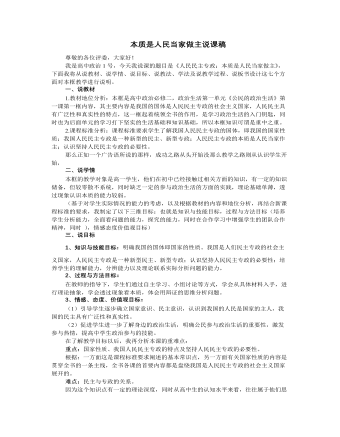
人教版高中政治必修2本质是人民当家做主说课稿
环节三案例分析突出难点这一环节,我将用多媒体展示我国反腐行动,将一个个贪污腐败者给予法律制裁的案例和东突分子分裂活动的例子,来得出我国专政的职能。这些例子具有典型性和时效性,能让学生容易从例子中得出知识点,引导学生理解我国的专政是对极少数敌人实行的专政。并通过《反分裂法》的制定,让学生讨论为什么我国既要实行民主职能又实行专政职能,以此来分析民主与专政的关系(区别和联系)。培养学生获取信息的能力,自主学习的能力以及全面看问题的能力,再结合教师的讲授,给学生一种茅塞顿开的感觉。环节四 情景回归 情感升华这一环节,我将设置分组讨论,让学生们分别从人民民主专政的重要地位、“民主”与“专政”这两项职能、改革开放的历史条件下新时期内容三个方面来分析为什么坚持人民民主是正义的事,讨论后每组派出代表来发表各自组的结论,得出我国要坚持人民民主专政。通过小组讨论,使学生学会在合作中学习,提高学生的语言表达和思维能力。
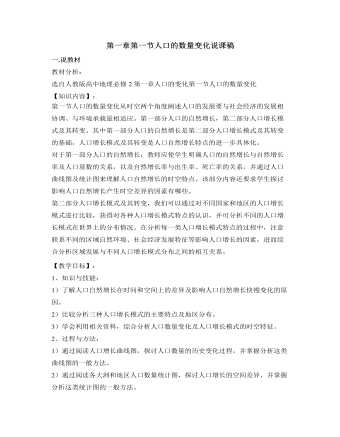
人教版高中地理必修2第一章第一节人口的数量变化说课稿
活动一:课本第三页的活动题,把学生分成几组然后让他们读图讨论,思考书上的几个问题,最后派个代表回答问题.最后教师做适当的补充:人口的自然增长不仅与人口自然增长率有关,而且还与人口基数有关.活动二:课本第七页的活动,先让两位学生阅读第六页的案例结合活动题思考问题,让几个组学生讨论所给的几个问题.让学生归纳最后教师做适当的补充.时间安排:由于本节内容不难因此整个教学过程是一节课的时间来完成的因此在教学过程中注意时间的把握,在做活动和讨论时注意把握时间,自己尽量少说废话.课堂小结通过这一节的学习,同学们正确理解和认识人口增长,增长模式和人口增长模式的转变。我们可以利用比较法、分析法来掌握,并联系现实生活,进行分析、判断,化理论知识于实践之中。
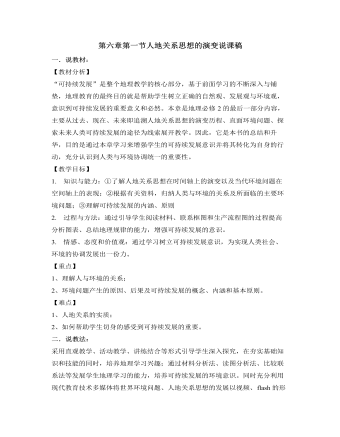
人教版高中地理必修2第六章第一节人地关系思想的演变说课稿
四、说教学过程:1、导入新课:以视频形式导入新课,说明环境问题产生原因,引出人地关系的重要性2、新课讲授:学习主题一:过去——人地关系的历史回顾以动画形式展现人地关系思想的发展,激发学生学习本专题的兴趣,归纳人与自然关系的演变过程。学习主题二:现状——直面环境问题以人类与环境关系模式图说明环境问题产生的原因,人地关系实质;以因果联系框图培养学生判读方法,了解人口、资源与环境三者之间的关系;通过阅读课文,了解环境问题的类型及其空间差异的表现;以图表了解不同国家和地区环境问题在空间轴上的表现;以《京都议定书》为引子说明保护环境是全人类的共同使命学习主题三:未来——可持续发展展示“可持续发展示意图”理解可持续发展内涵、原则
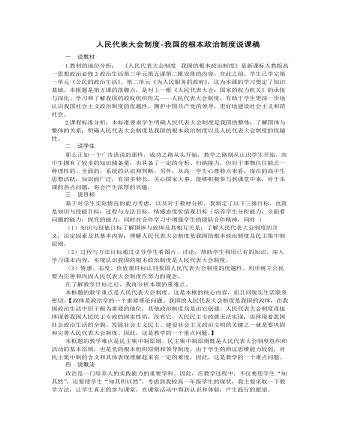
人教版高中政治必修2人民代表大会制度-我国的根本政治制度说课稿
材料四:两会结束后,全国人大常委会办公厅将召开代表建议交办会,将这些建议统一交由国务院有关部委、最高人民法院、最高人民检察院等180个机关、单位办理。】通过分组讨论,请学生回答问题,我将做相应的点拨和补充:在人民代表大会与人民的关系上,从产生看,人民代表大会的代表由民主选举产生,对人民负责,受人民监督;从过程看,在人民代表大会的活动中,法律的制定和重大问题的决策,由人民代表充分讨论,实行少数服从多数原则,民主决定;在人民代表大会与其他国家机关的关系上,人大是国家权力机关,国家行政机关、审判机关、检察机关都由它产生,对它负责,受它监督。人大统一行使国家权力,它所决定的事情不是自己直接去办,是由国家行政和司法等机关去贯彻执行。请同学们根据刚所学的知识,将民主集中制原则的具体体现,用表格形式进行归纳总结,培养了学生归纳分析能了和独立思考的能力。
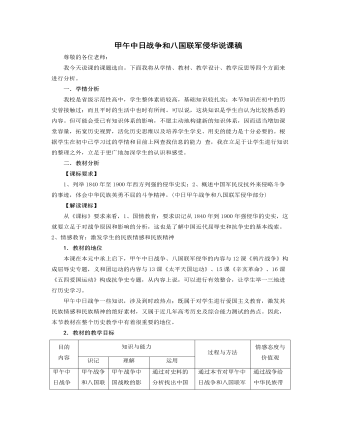
人教版高中历史必修1甲午中日战争和八国联军侵华说课稿
四.设计反思我在设计本课时,希望通过情境的创设充分再现历史,并利用多媒体辅助教学,破重点、化难点,让学生主动参与到学习过程中,从而突破狭小的教室空间,让学生真正做到感知历史,立足现实,展望未来。自主,交流、合作、探究是课程改革中着力倡导的新型学习方式。课堂教学中如何开展小组合作的探究学习存在着很多困难,首先是课堂教学时间有限,如何体现面向全体,给每个学生以机会?再次,历史问题的讨论只能依托于史料才能使讨论不沦为空谈,课堂上通过网络提供大量的史料(文字、图片或其他),势必不能有充分时间让学生阅读分析。如何解决这些问题呢?措施一:要形成较固定的历史学习合作小组。选定一位同学担任组长,负责协调措施二:要设置有利于学生探究的问题情境措施三:要把课堂教学与课外学习结合起来。在课前就印发相关的材料,或引导学生去查阅相关的资料,让学生有个充分的阅读、思考、交流的时间,是保证课堂上小组交流能成功实现的一个前提
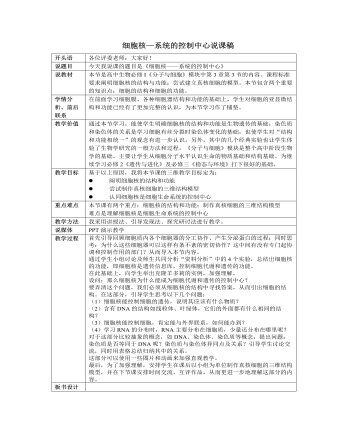
人教版高中生物必修1细胞核—系统的控制中心说课稿
首先引导回顾细胞质内各个细胞器的分工协作、产生分泌蛋白的过程;同时思考:为什么这些细胞器可以这样有条不紊的密切协作?这中间有没有专门起协调和控制作用的部门?从而导入本节内容。通过学生小组讨论及师生共同分析“资料分析”中的4个实验,总结出细胞核的功能,即细胞核是遗传信息库,控制细胞代谢和遗传的功能。在此基础上,向学生举出克隆羊多莉的实例,加强理解。设问:那么细胞核为什么能成为细胞代谢和遗传的控制中心?要弄清这个问题,我们必须从细胞核的结构中寻找答案,从而引出细胞的结构。在这部分,引导学生思考以下几个问题:(1)细胞核能控制细胞的遗传,说明其应该有什么物质?(2)含有DNA的结构如线粒体、叶绿体,它们的外面都有什么相同的结构?(3)细胞核能控制细胞,肯定能与外界联系,如何能办到?(4)学习RNA的分布时,RNA主要分布在细胞质,少量还分布在哪里呢?
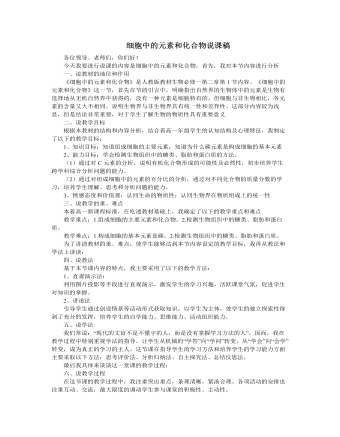
人教版高中生物必修1细胞中的元素和化合物说课稿
一、说教材的地位和作用《细胞中的元素和化合物》是人教版教材生物必修一第二章第1节内容。《细胞中的元素和化合物》这一节,首先在节的引言中,明确指出自然界的生物体中的元素是生物有选择地从无机自然界中获得的,没有一种元素是细胞特有的。但细胞与非生物相比,各元素的含量又大不相同。说明生物界与非生物界具有统一性和差异性。这部分内容较为浅显,但是结论非常重要,对于学生了解生物的物质性具有重要意义二、说教学目标根据本教材的结构和内容分析,结合着高一年级学生的认知结构及心理特征,我制定了以下的教学目标:1、知识目标:知道组成细胞的主要元素;知道为什么碳元素是构成细胞的基本元素2、能力目标:学会检测生物组织中的糖类、脂肪和蛋白质的方法。(1)通过对C元素的分析,说明有机化合物形成的可能性及必然性,初步培养学生跨学科综合分析问题的能力。(2)通过对组成细胞中的元素的百分比的分析,通过对不同化合物的质量分数的学习,培养学生理解、思考和分析问题的能力。
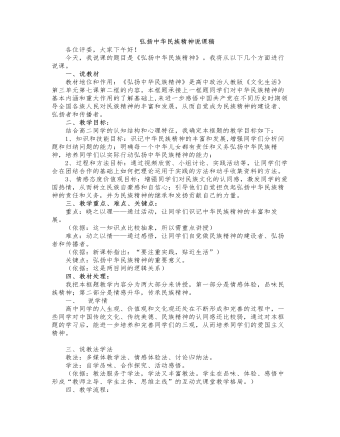
人教版高中政治必修3弘扬中华民族精神说课稿
3、评:以评促行。(6分钟)高中生的年龄特点决定了他们非常重视别人对自己的评价,渴望得到他人的肯定与鼓励。(所以我在班上组织一个活动:让同学们评选出班上“讲文明懂礼貌的文明之星”、“勤思考善创新的学习之星”(先让同学推举大家都认同的4位同学,然后对他们进行投票,投票结果将在下堂课上公布)以此活动来激发同学们用实际行动做民族精神的践行者和传播者。)4、唱:以情激行。(2分钟)在课程内容讲授结完毕后,组织全班同学跟着音乐高唱孙楠的《红旗飘飘》,生化情感,激发同学们的爱国情感。五、课堂拓展(请同学们各展才华:课后让同学们各自准备一个项目以体现民族精神。(项目形式是:或作文、书画;或剪纸、或歌曲小品)……让同学们用实际行动祝愿我们伟大的祖国更加繁荣昌盛!让我们的民族精神代代相传!)
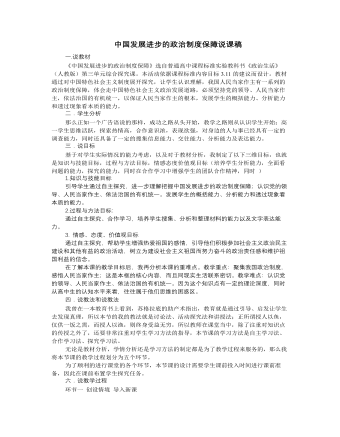
人教版高中政治必修2中国发展进步的政治制度保障说课稿
环节四 课堂总结 巩固知识本节课我采用线索性的板书,整个知识结构一目了然,为了充分发挥学生在课堂的主体地位,我将课堂小结交由学生完成,请学生根据课堂学习的内容,结合我的板书设计来进行小结,以此来帮助教师在第一时间掌握学生学习信息的反馈,同时培养学生归纳分析能力、概括能力。环节五 情景回归,情感升华我的实习指导老师告诉过我们,政治这一门学科要从生活中来到生活去,所以在课堂的最后布置课外作业,以此培养学生对理论的实际运用能力,同时检验他们对知识的真正掌握情况,以此达到情感的升华,本节课,我根据建构主义理论,强调学生是学习的中心,学生是知识意义的主动建构者,是信息加工的主体,要强调学生在课堂中的参与性、以及探究性,不仅让他们懂得知识,更让他们相信知识,并且将知识融入到实践当中去,最终达到知、情、意、行的统一。
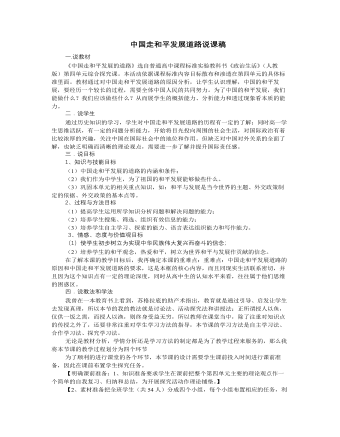
人教版高中政治必修2中国走和平发展道路说课稿
教师点评:根据小论文的写作情况对小论文给予肯定,同时指出其有待修改的地方。学生在写小论文的时候是根据教材中的提示来写的,所以对于教材中的这些提示,可以作一个说明。如“在发展的过程中,我们面对怎样的挑战和困难”,对于这点,学生可能会出现片面看问题的不足,一旦这种情况出现,我们就要及时进行说明:我们面临的挑战和困难既有来自国内的,也有来自国际的,引导学生学会用全面的观点分析问题。教师引导学生明确作为中学生可以从以下方面去作准备:第一,要有国家观念、民族意识,不断增强民族自豪感、自尊心和自信心;第二,关注国家大事;第三,自自觉履行维护国家统一和民族团结的义务,维护国家安全、荣誉和利益;第四,努力学好科学文化知识,提高自己的科学文化素质和思想道德素质,增强各个方面的能力,掌握振兴中华民族的本领,这也是中学生最需要做到的。通过探究活动,培养学生获取信息的能力,自主学习的能力以及全面看问题的能力,再结合教师的讲授,给学生一种茅塞顿开的感觉。
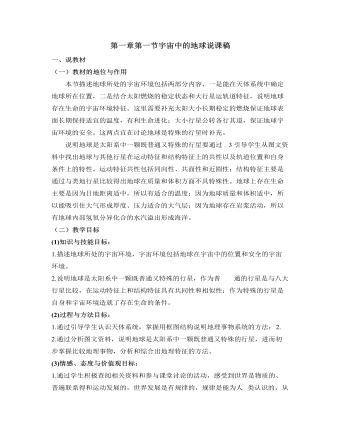
人教版高中地理必修1第一章第一节宇宙中的地球说课稿
(一)教材的地位与作用本节描述地球所处的宇宙环境包括两部分内容,一是能在天体系统中确定地球所在位置,二是结合太阳燃烧的稳定状态和大行星运轨道特征,说明地球存在生命的宇宙环境特征。这里需要补充太阳大小长期稳定的燃烧保证地球表面长期保持适宜的温度,有利生命进化;大小行星公转各行其道,保证地球宇宙环境的安全。这两点宜在讨论地球是特殊的行星时补充。说明地球是太阳系中一颗既普通又特殊的行星要通过 3引导学生从图文资料中找出地球与其他行星在运动特征和结构特征上的共性以及轨道位置和自身条件上的特性。运动特征共性包括同向性、共面性和近圆性;结构特征主要是通过与类地行星比较得出地球在质量和体积方面不具特殊性。地球上存在生命主要是因为日地距离适中,所以有适合的温度;因为地球质量和体积适中,所以能吸引住大气形成厚度、压力适合的大气层;因为地球存在岩浆活动,所以有地球内部氢氧分异化合的水汽溢出形成海洋。
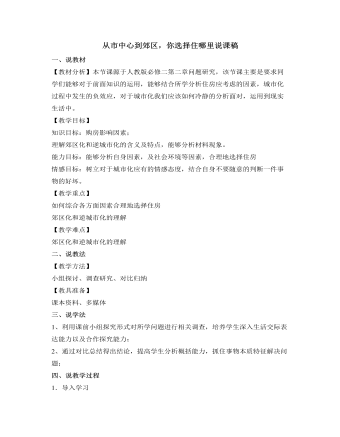
人教版高中地理必修2从市中心到郊区,你选择住哪里说课稿
课前活动:分成四组,对南京三个住房地段进行调查,新街口夫子庙、板仓、仙林,对住房居民进行问卷调查,自行设计调查问卷,分析该地段的房价要求,居民的要求,居民为何要在该地段购买住房,基础设施设置等等其它与居民购房有关的因素。◆设计意图:利用课前小组探究形式对所学问题进行相关调查,不仅让学生掌握知识了解知识来源于社会还能培养学生深入生活交际表达能力以及合作探究能力;3.问题设计同学们,不知道你们在调查过程中是否发现一个问题,郊区的房子,特别是别墅,都是些高档居所,许多有钱人的居住场所,那为什么会这样呢?伴随着城市化进程中居民都往城里挤,为什么还会有许多有钱人往郊区搬呢?这就是我们今天要研究的第二个问题:逆城市化。◆设计意图:承转过渡知识,从购房选择因素的学习过渡到郊区化的学习,同时培养学生发现问题的能力,给学生以启迪。





















